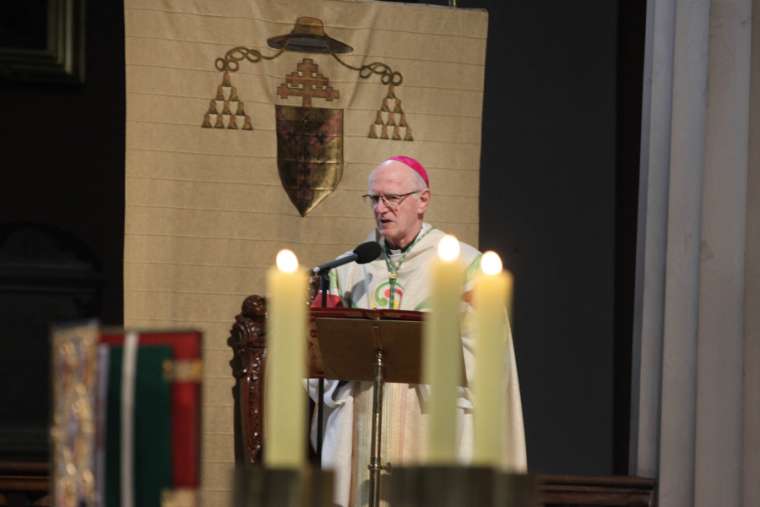Bishop Dermot Farrell is installed as the new archbishop of Dublin in St. Mary’s Pro-Cathedral, Dublin, Ireland, on Feb. 2, 2021. / John McElroy
In a homily on St. Patrick’s Day, Dublin’s new archbishop called on authorities to prioritize the right to worship as COVID-19 measures are eased next month.
Archbishop Dermot Farrell said yesterday: “As a matter of human dignity and fairness — but even more so as a matter of wellbeing and the restoration of normality, I call on the public authorities to give assurance that the legitimate desire of people to gather responsibly and within reasonable guidelines to exercise their constitutional right to worship will be prioritized in the easing of restrictions.”
Ireland is under strict “Level 5” COVID-19 restrictions until 5 April. Under government health measures, public worship has been suspended in the country since 7 October 2020. Public religious services were also suspended in Ireland from March to June 2020.
In his homily for St. Patrick’s Day, Farrell noted that the past year “has been a tumultuous one for people of faith with all churches closed over many months for public worship.”
The archbishop, who was installed in Dublin on 2 February, emphasized that the Catholic Church in Ireland has taken public health guidelines seriously and followed them diligently whenever public Masses were permitted.
Despite having developed other creative ways to support people through online streaming and phone calls, “for many people, being denied the opportunity to attend Mass and receive Holy Communion has been difficult: it has affected how they are nourished and sustained by their faith,” Farrell said.
“Let us not underestimate the consequences of this in people’s lives,” he added, emphasizing that “our faith and its practice — both private and communal — makes a difference.”
According to the archbishop, this is what St. Patrick proclaimed in Ireland: “Chríost liom, Chríost romham — Christ be with me, Christ before me, Christ on my right, Christ on my left.”
He underlined that prayer and communal worship in the celebration of the Mass were not “an optional pastime” for Catholics.
“For people of faith, the effects of the pandemic are most keenly felt at the communal level,” he said. “We now have to ask if there are not better ways of managing this essential dimension of our lives together.”
The Irish government has not revealed what COVID-19 restrictions will be in place after April 5, but local media have reported that the easing of measures next month will likely be minor.
Bishops in Northern Ireland announced 17 March that public worship could resume from Friday 26 March, right before Holy Week.
In a statement, the bishops stressed “the cautious nature of this return to public worship,” noting that there is still a dispensation from attending Mass on Sundays and Holy Days, and people are encouraged to participate in liturgies via live stream rather than in-person.
Farrell said that many citizens were watching the government’s planned exit from the current severe restrictions and they “expect their religious practice to be respected by the public authorities, and not be subordinated to commercial interests.”
“This is a matter of health and wellbeing for many,” he said. “Health, as we discover again and again, is not just a matter of avoiding disease, it is a matter of how we are in ourselves, it involves our emotions and our mental health.”
The Dublin said it was important to take proper measures to prevent the transmission of COVID-19, but that religious worship “has a clear human priority over other activities.”
He criticized measures restricting funerals to attendance by 10 people or fewer, calling it “harsh and unfair.” He argued that “this is tolerable only in the most extreme circumstances, and for the shortest possible period.”
The archbishop concluded his homily by encouraging Catholics to pray that “we might be caught by St. Patrick’s belief in the power of prayer, the convictions of his faith, and in the closeness of God, as well as the support and prayers of our sisters and brothers.”
“As we turn towards God for protection, as St. Patrick did, may the Lord bring us inner freedom, a dedication to the call of God, and a deep trust in the active presence of the Holy Spirit,” he said.
Source: CNA

